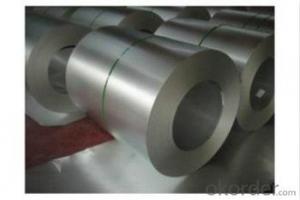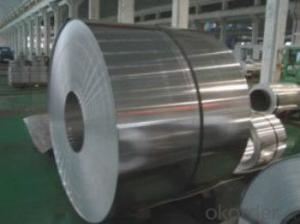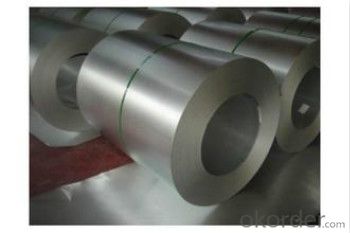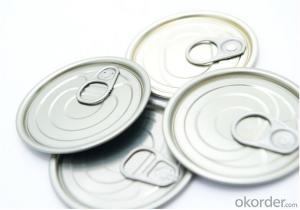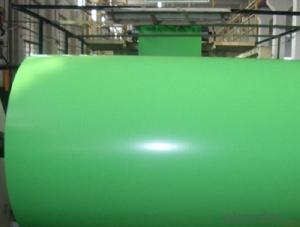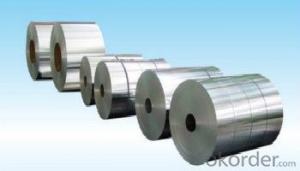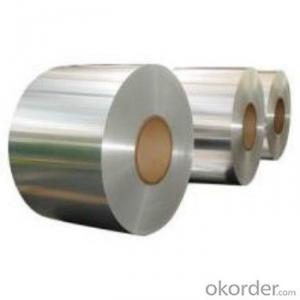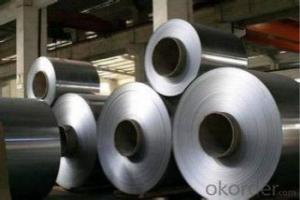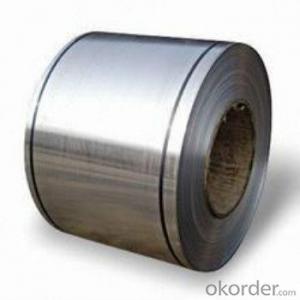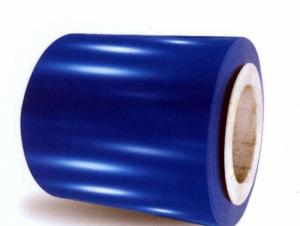6001 Aluminum Coil High Quality Mill Finished Aluminum Coil AA3003 Temper H18
- Loading Port:
- Tianjin
- Payment Terms:
- TT or LC
- Min Order Qty:
- 5 m.t.
- Supply Capability:
- 4000 m.t./month
OKorder Service Pledge
OKorder Financial Service
You Might Also Like
Specification
1. Aluminum Coil Description:
Aluminum coil, is a rolled product, produced in a coiled form of continuous strip, and having an ID (Inner diameter) and OD (Outer diameter).Common alloy coil are used for a wide variety of applications, alloy 1050, 1060, 3003, 3105, 3005, 5052, 5754, 5083, 6061, 8011, 8021, and so on, in thickness from 0.0065-7mm, in width from 300- 2200mm.
2.Main Features of the Aluminum Coil:
• Great ductility
• Heat conductivity
• Anti-corrosion
• Moisture resistanve
3.Aluminum Coil Images
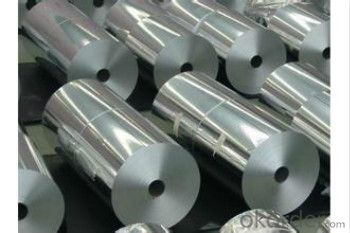
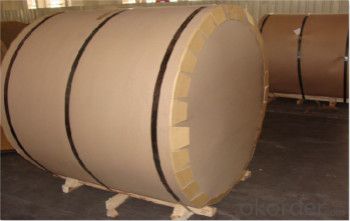
4.Aluminum Coil Specification
Aluminum Coil/Sheet | |
Main Specification | |
Alloy | AA1xxx (AA1050, AA1060, AA1070, AA1100 etc.) |
AA3xxx (AA3003, AA3004, AA3005, AA3105 etc.) | |
AA5xxx, AA6XXX (AA5052,AA5083, AA5754, AA6061, AA6062 etc.) | |
AA8xxx(AA8011, AA8006, AA8079 etc.) | |
Temper | H14,H16, H18, H22, H24, H26, H32,O/F |
Thickmess | ≥0.2mm |
Width | 30mm-2100mm |
Standard | GB/T 3880-2006 |
Special specification is available on customer's requirement | |
5.FAQ
We have organized several common questions for our clients,may help you sincerely:
(1) How to guarantee the quality of the products?
We have established the international advanced quality management system, every link from raw material to final product. we have strict quality test; we resolutely put an end to unqualified products flowing into the market. At the same time, we will provide necessary follow-up service assurance.
(2) MOQ?
For trail order, we accept 5 MT.
(3) Payment term?
30% deposit, balance against the BL copy; 100% L/C at sight
(4) What is the delivery time?
Depends on actual order, around 30 to 35 days
- Q: Is it possible to recycle aluminum coils in various countries around the world?
- <p>Yes, aluminum coils can be recycled in many countries around the world. Recycling aluminum is a global practice due to its high value and the energy savings associated with recycling compared to producing aluminum from raw materials. Different countries have their own recycling programs and facilities that handle aluminum waste, including coils. However, the specific regulations and processes for recycling aluminum coils can vary by country, and it's important to check local recycling guidelines to ensure proper disposal and recycling.</p>
- Q: This question asks for methods to determine whether an aluminum coil is new or old.
- <p>To determine if an aluminum coil is new or old, you can look for several signs: 1. Surface appearance: New coils typically have a clean, smooth surface without scratches or discoloration. 2. Packaging: New coils are usually well-packaged and protected. 3. Manufacturing date: Check for any labels or markings that indicate the manufacturing date. 4. Quality of the material: New coils should have consistent thickness and no signs of corrosion or wear. 5. Performance: New coils should perform as expected without any issues. If you're still unsure, consider consulting with a professional or the supplier for more information.</p>
- Q: Can aluminum coils be painted or coated after installation?
- Yes, aluminum coils can be painted or coated after installation. Aluminum is a versatile material that can be easily painted or coated to enhance its appearance or provide additional protection. Painting or coating aluminum coils after installation can help prevent corrosion, improve durability, and provide a customized finish. The type of paint or coating used will depend on the specific requirements and desired outcome. It is important to ensure that the aluminum surface is properly cleaned and prepared before applying any paint or coating to ensure adhesion and longevity.
- Q: What are the different tempers of aluminum coils?
- The different tempers of aluminum coils refer to the varying levels of hardness and strength that can be achieved through different heat treatments. Aluminum coils can be subjected to various tempering processes to alter their physical and mechanical properties for specific applications. The most common tempers for aluminum coils include: 1. Soft (O Temper): This temper represents the annealed state of aluminum, where the metal is fully soft and easily formable. It has low strength but excellent ductility, making it suitable for applications that require extensive shaping or bending. 2. Half Hard (H14 Temper): This temper offers moderate strength and hardness, while still retaining some formability. It is used in applications where a balance between strength and flexibility is necessary, such as roofing or cladding. 3. Hard (H18 Temper): This temper provides high strength and hardness, with reduced formability. It is commonly used in applications that demand structural integrity and resistance to deformation, such as automotive parts or industrial equipment. 4. Extra Hard (H22, H24, H26 Temper): These tempers are achieved through additional cold working or strain hardening processes. They offer even higher strength and hardness but sacrifice some ductility. They are often utilized in applications that require enhanced mechanical properties, such as aerospace components or high-stress structural parts. 5. Tension Leveled (T Temper): This temper involves stretching the aluminum coil beyond its elastic limit and then stabilizing it. It helps to eliminate internal stresses and improve flatness, making it suitable for applications that demand precise dimensional stability, like electronic devices or architectural panels. It is important to note that there are many other tempers available for aluminum coils, each designed to meet specific requirements. The choice of temper depends on factors such as the intended application, desired mechanical properties, and processing capabilities.
- Q: What are the different elongation values of aluminum coils?
- The elongation values of aluminum coils can vary depending on the specific alloy and temper of the aluminum. Generally, aluminum coils have excellent elongation properties, which means they can be stretched or deformed without breaking. For example, the commonly used alloy 3003-H14 has an elongation value of around 20-30%. This means that the aluminum coil can stretch up to 20-30% of its original length before it breaks. On the other hand, high-strength alloys like 7075-T6 have lower elongation values of around 9-13%. These alloys are designed for applications where strength is crucial, but they sacrifice some elongation properties. It's important to note that elongation values can also be influenced by the processing and treatment of the aluminum coils. For instance, annealing or heat treatment can improve the elongation properties of certain alloys. In summary, the elongation values of aluminum coils can range from 9% to 30%, depending on the alloy, temper, and processing methods used.
- Q: Explain the relationship between aluminum coil and aluminum alloy in a few sentences.
- <p>Aluminum coil and aluminum alloy are related in that aluminum coil can be made from aluminum alloy. An aluminum alloy is a material composed of aluminum and other metallic or non-metallic elements, which are mixed to enhance its properties. Aluminum coils are long, rolled sheets of aluminum that can be made from various types of aluminum, including alloys. The use of an alloy allows for the creation of aluminum coils with specific characteristics, such as increased strength, corrosion resistance, or formability, depending on the application requirements. Thus, aluminum coils are often manufactured from aluminum alloys to meet the demands of diverse industries.</p>
- Q: Are there any specific installation requirements for aluminum coils?
- Yes, there are specific installation requirements for aluminum coils. These requirements typically include proper handling, storage, and positioning of the coils to ensure they remain undamaged during installation. Additionally, proper cleaning, lubrication, and sealing of the coil connections are commonly recommended to maintain optimal performance and prevent leaks. It is important to consult the manufacturer's guidelines and follow industry standards when installing aluminum coils to ensure a successful and efficient installation.
- Q: How are aluminum coils tested for quality control?
- Aluminum coils go through numerous quality control tests to ensure their reliability and performance. One primary test is the dimensional inspection, where the coils' physical dimensions are measured and compared to the manufacturer's specifications. This helps identify any discrepancies in length, width, thickness, or diameter. Another critical test is the visual inspection, where the coils are thoroughly examined for surface defects like scratches, dents, or discoloration. This visual examination is crucial to ensuring that the coils meet the required aesthetic standards. To evaluate the mechanical properties, various mechanical tests are conducted. Tensile strength tests measure the coils' resistance to breaking under tension, determining their durability and strength. In addition, hardness tests assess the coils' resistance to indentation or deformation. The hardness values are compared to predetermined standards to verify if the coils meet the necessary criteria. Corrosion resistance testing is also conducted to assess the coils' ability to withstand corrosion over time. This test exposes the coils to harsh environments or corrosive substances, which is crucial as aluminum is often used in applications that may involve contact with corrosive elements. Electrical conductivity tests ensure the proper functioning of the coils in electrical applications. Conductivity is measured and compared to the required specifications to guarantee that the coils possess the desired electrical characteristics. Additionally, depending on the specific requirements of the aluminum coils, other tests like chemical composition analysis, surface roughness evaluation, and coating adhesion tests may also be performed. Overall, these comprehensive quality control tests enable manufacturers to ensure that aluminum coils meet necessary standards, ensuring their quality, performance, and reliability in various applications.
- Q: Can aluminum coils be used for electrical wiring?
- Yes, aluminum coils can be used for electrical wiring. Aluminum is a commonly used material for wiring due to its high conductivity and affordability. However, it requires special precautions and techniques during installation to ensure proper connections and prevent potential risks such as corrosion or overheating.
- Q: What are the potential safety hazards when using a soldering iron on copper or aluminum coils?
- <p>Using a soldering iron to solder copper or aluminum coils can pose safety risks. Copper and aluminum can react when joined, potentially leading to a galvanic corrosion. Additionally, the high heat from the soldering iron can cause the metal to expand or deform, especially if not handled properly. Always ensure proper ventilation to avoid inhaling fumes from the soldering process. Wear heat-resistant gloves and safety glasses to protect against burns and flying debris. Ensure the work area is clear of flammable materials to prevent fire hazards.</p>
Send your message to us
6001 Aluminum Coil High Quality Mill Finished Aluminum Coil AA3003 Temper H18
- Loading Port:
- Tianjin
- Payment Terms:
- TT or LC
- Min Order Qty:
- 5 m.t.
- Supply Capability:
- 4000 m.t./month
OKorder Service Pledge
OKorder Financial Service
Similar products
Hot products
Hot Searches
Related keywords
